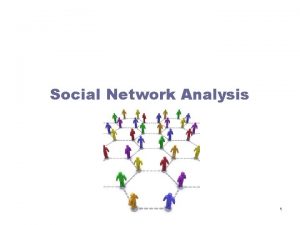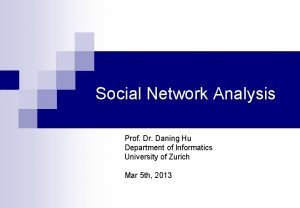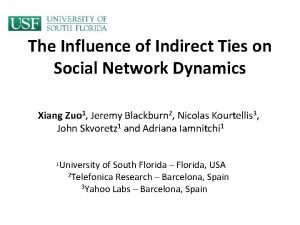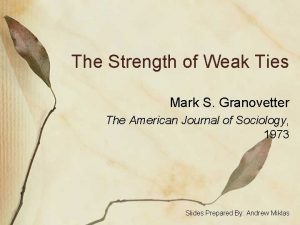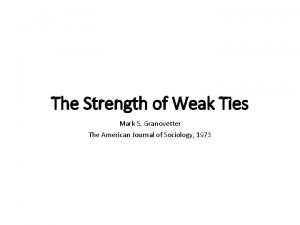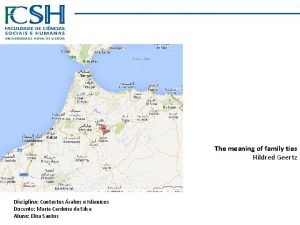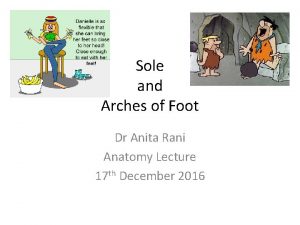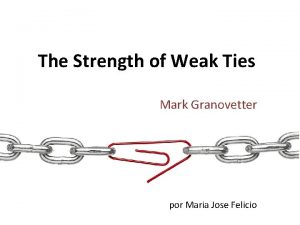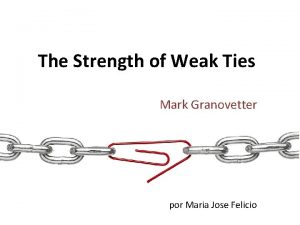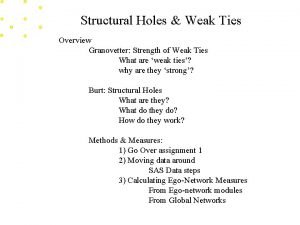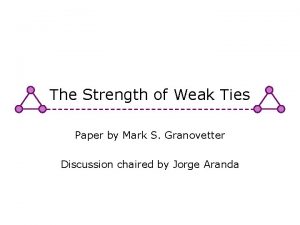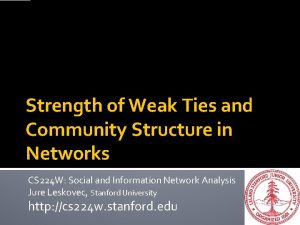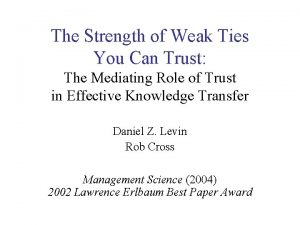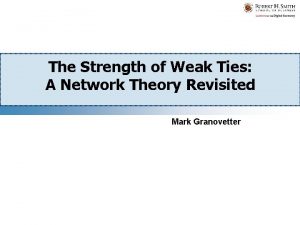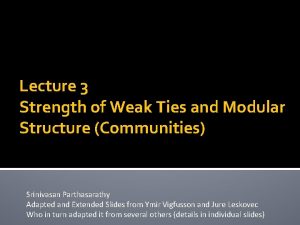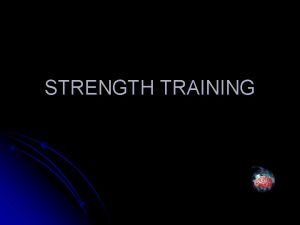The Strength of Weak Ties Mark S Granovetter




















- Slides: 20

The Strength of Weak Ties Mark S. Granovetter The American Journal of Sociology, 1973

Introduction • “One of the most influential sociology papers ever written” (Barabasi) • One of the most cited (Current Contents, 1986) • Interviewed people and asked: “How did you find your job? ” • Kept getting the same answer: “through an acquaintance, not a friend”

Context • macro patterns • Social mobility, community organization • micro behavior • Interactions within small groups • It is interesting to offer explanations for how simple processes at the micro-level of individual nodes and links can have complex effects that ripple through a macro-level of population as a whole.

Triadic closure • (Main Idea) If two people in a social network have a friend in common, then there is an increased likelihood that they will become friends themselves at some point in the future Edges BC, FG, ED are results of triadic closure. DG is not a result of triadic closure.

Bridge and local bridge AB is a bridge. The removal of AB partitions the network AB is a local bridge. The removal of AB increases the distance between A, B.

Bridges and local bridges • Bridges play an important role of the micro => macro puzzle. For example, • Bridges allow diffusion of information between otherwise disconnected communities. • Local bridges bring otherwise distant communities together

Strong and Weak Ties • Links can have a wide range of possible strengths, but for conceptual simplicity we’ll categorize all links in the social network as belonging to one of two types: • stronger links, correspond to friend, and • weaker links, correspond to acquaintances • Strong tie => • lots of time together • lots of opportunity for B to interact with A’s friends • greater chance that B will be “compatible” with A’s friends

Forbidden Triad • (Granovetter said) The Strong Triadic Closure Property is violated if a node A has strong ties with two other nodes B and C, but there is no edge (strong or weak) between B and C. Otherwise the property is satisfied. New edge need not be strong s A s s • Any time strong tie A-B exists, then all of A’s strong ties will be at least weakly connected to B (Granovetter said)

Triadic closure with string and weak ties Can AB be a local bridge? Local bridges correspond to weak ties.

Example of triads

All Bridges are Weak Ties! • Proof: • If A-B and A-C are strong, then forbidden triad implies that B-C is at least weak • If A-B is deleted, then A can still reach B via A-C-B • All local bridges are also weak ties • Proof is identical

Implications • Removal of weak ties raises path lengths more than removal of strong ties • Assume: probability of info passing successfully between two node is proportional to the number of paths connecting the two nodes • Conclusion: Removal of a weak edge damages the connectivity more than the removal of a strong edge

Tipping Point • An individual’s uptake of a new technique depends on how many of those around him have “bought in” • The “Tipping Point” (Gladwell, 2000) • Quickly adopted techniques must be rapidly spread to many cliques

Tipping Point • People with many weak ties critical to spreading the idea • Example: Mass Hysteria in Textile Factory • Earliest people “infected” were: • friends with very few • acquaintances with many • Acted as “seeders”, rapidly disseminating idea to many friend circles at once

Community Co-ordination • Imagine a community organizing to defeat a common threat • Requires organization and leadership • Leadership requires trust in the leaders • Trust is difficult without a connection

Community Co-ordination • Without weak links, community exists as a set of strongly connected, but disjoint cliques • No one suitable to act as a leader for all • Example: Boston West End • Connections were mainly family-based • Few ways for weak links to be formed

Access to Resources • Our weak ties are with people whose ties are with those socially distant to us. • Weak ties bring us knowledge of our community not available through friends • Many weak ties => more access to wider community’s ideas, resources, etc. • Few weak ties => little information of outside world

Access to Resources • Example: Academic Hiring • School’s reluctance to hire your own Ph. D’s • Want to prevent “intellectual inbreeding”

Finding a Job • Do leads for new jobs come through strong or weak contacts? • Strong: More motivation to help you, since they know you better • Weak: Likely less overlap with leads you can easily get elsewhere • Study by author shows that weak wins • Most job referrals come through those who we see rarely: old school friends, former co-workers, etc.

Conclusion • Opposite to what you might expect: • Weak personal relationships bind communities together • Exclusively strong ties lead to global fragmentation
 Granovetter strength of weak ties
Granovetter strength of weak ties Daning hu
Daning hu Indirect ties definition
Indirect ties definition Mark s granovetter
Mark s granovetter Mark s. granovetter
Mark s. granovetter Strong acid weak base titration graph
Strong acid weak base titration graph Weak acid and weak base reaction
Weak acid and weak base reaction What are strong bases
What are strong bases You are my strength when i am weak
You are my strength when i am weak You are my strength when i am weak
You are my strength when i am weak Darrow solution half strength
Darrow solution half strength Percent strength w/v
Percent strength w/v Steel bar
Steel bar Percentage strength v/v formula
Percentage strength v/v formula Family ties meaning
Family ties meaning The dangers of soul ties
The dangers of soul ties Fdb
Fdb Optimist tuning guide
Optimist tuning guide A new settlement that keeps close ties to its homeland
A new settlement that keeps close ties to its homeland What is aave
What is aave Casual friends have strong emotional ties
Casual friends have strong emotional ties
